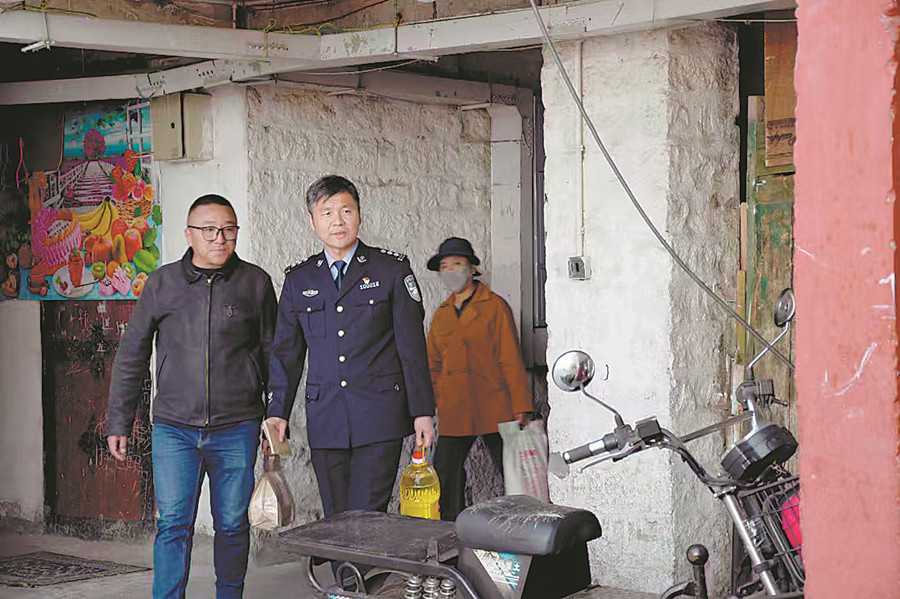Decades-long support fuels growth of Lhasa

Police officer Wang Yuanbin from Jiangsu province visits a remote police station in the Xizang autonomous region. [Photo provided to China Daily]
Over the past three decades, Jiangsu province has been aiding Lhasa, capital of the Xizang autonomous region, by promoting long-term stability, improving people's livelihoods and assisting with high-quality development around the city.
The two places are also closely interdependent, despite being more than 3,800 kilometers apart.
Since the province began assisting the city in 1994, Jiangsu has dispatched 10 groups of nearly 1,000 professionals and invested over 8 billion yuan ($1.1 billion) in more than 700 projects, as reported by Xizang Daily.
Jiangsu's assistance has ramped up since 2012. The province has invested more than 5 billion yuan in aid, with over 80 percent directed to grassroots levels to ensure and improve people's livelihoods.
Industrial assistance to Xizang is the core focus of Jiangsu's aid work. It helps develop industries in Lhasa to boost economic strength and foster mutual economic benefits.
For example, the Gesang Tang Modern Agricultural and Animal Husbandry Industry Demonstration Park, located in Lhasa's Lhundrub county, was built thanks to an investment of 150 million yuan.
Traditional livestock management and operation methods meant breeding cycles were long, genetic resources were degraded and economic benefits were relatively low.
To improve the quality of local yaks, the demonstration park has selected top breeds from across the country to mate with the inferior ones.
"The new cows bred in the demonstration park grow exceptionally large, have good health and are less prone to illness, and the time for them to reach market weight has been reduced from the previous seven to eight years to around five years now," Kelsang Wangchuk, a farmer from the village, was quoted as saying by Xizang Daily. "Our income has also increased."

Wang (middle) visits a family in a community in Lhasa. [Photo provided to China Daily]
In terms of public security, Jiangsu has dispatched more than 1,400 cadres to support Xizang in various projects, with aid totaling over 169 million yuan.
They have also provided on-the-job training opportunities for over 2,200 police officers in Lhasa.
With Jiangsu's support, Lhasa has established several modern facilities such as criminal forensic and electronic data laboratories.
According to the Jiangsu Public Security Department, the public security agencies of Jiangsu and Lhasa signed a framework agreement in September last year for mutual assistance.
They provided comprehensive support to enhance the technological capabilities of the Lhasa public security system, which aimed to maintain security and stability.
Police officer Wang Yuanbin was dispatched from Jiangsu to work as a cadre in the Lhasa public security bureau for three years. This year marks his second year of service in the Xizang capital.
Since his arrival in June 2022, Wang has served as deputy head of the bureau.
His main tasks include improving organizational efficiency, strengthening the cybersecurity support team and boosting police technology.
He has enhanced support in terms of technology and talent by introducing the advanced practices, management experience and case-handling capabilities of the Jiangsu provincial public security system.

Graduates from the Lhasa Second Vocational and Technical School work at a factory in Xizang. Since 2016, more than 4,000 graduates from the school have found employment, aided by six national-level demonstration vocational schools in Jiangsu province. [Photo provided to China Daily]
According to Wang, in the first half of last year, officers discovered that a network of hackers had taken control of the ticketing systems at popular tourist sites such as the Potala Palace and Jokhang Temple in Lhasa.
"Through technical means, they engaged in illegal ticket theft and sales, severely disrupting and damaging the tourism market order in Lhasa. This led to a period during which tickets for these sites were extremely difficult to obtain," Wang said.
Subsequently, he led a special task force to conduct investigations and apprehend suspects in provincial-level regions such as Jiangsu, Guangdong, Sichuan, Beijing and Zhejiang.
After more than six months, the case was successfully cracked, and two main suspects were sentenced according to the law, Wang said.
"This case became the first successful prosecution in the country against a hacker group illegally accessing computer information systems to commit technical ticket fraud," he said.
























